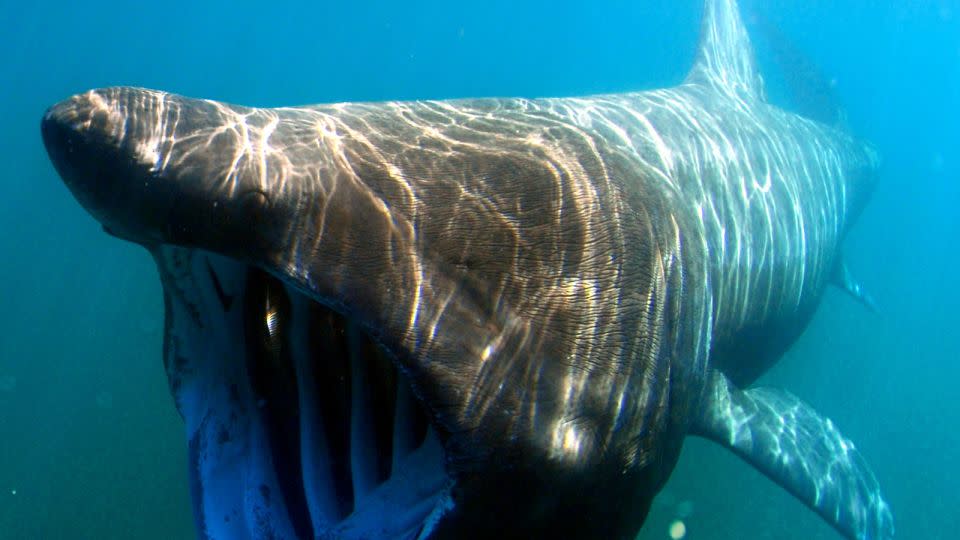Sign up for CNN’s Wonder Theory science newsletter. Explore the universe with news on fascinating discoveries, scientific advancements and more.
Rare footage captured by a camera strapped to the back of an endangered shark shows the jarring moment it was struck by a boat — prompting the animal to dash into deep waters and rest for hours.
It’s not clear whether the massive 23-foot (7-meter) animal, known as a basking shark, ultimately survived the collision.
But the incident indicates that such run-ins may be all too normal for ocean-dwelling species, according to researchers.
The video — which could be among the first of its kind ever recorded — highlights a need to better protect these sharks as well as better understand them, according to Dr. Alexandra McInturf, a research associate at Oregon State University who coauthored a study about the incident. The findings appear in a paper published Wednesday in the journal Frontiers in Marine Science.
“We’re calling for a legally enforceable code of conduct in this area, with speed regulations in particular,” McInturf said, referring to the waters around the Blasket Islands, off the coast of Ireland, where the basking shark incident occurred and one of the few places in the world the animals are known to congregate. “What I most hope would come out of this is just more research on this species.”
Large and elusive
The basking shark is a relatively gentle species, known for skimming the ocean’s surface for tiny planktonic crustaceans with their gaping jaws — and filter feeding in a way that’s similar to the behaviors of its relatives the whale shark and megamouth shark.
The basking shark is a massive creature, growing up to 40 feet (12 meters) long, and is among the largest fish in the world — second only to the whale shark.
Basking sharks are also endangered. The International Union for Conservation of Nature estimates that around 20,000 remain in the world.
In an effort to collect more data on the creatures’ foraging and eating habits, McInturf and her research partners have tagged and strapped cameras to roughly 20 basking sharks.
Then, on April 24, one of the cameras caught the unexpected: images of a basking shark feeding near the surface before it experiences a sharp, sudden strike against the hull of a boat.
The footage also shows the aftermath of the encounter, including a large scratch drawn across the shark’s back near its dorsal fin, and some of the blue anti-fouling paint — a type of coating used on the bottom of boats to prevent barnacle buildup — that marred the animal’s speckled skin.
Marine traffic and endangered species
Researchers have long known that boats and other marine traffic can pose a threat to sea creatures.
While the problem is fairly well documented for whales, however, there is less data indicating how severe the issue is for sharks.
But the video and study findings that came out of the incident are timely for the shark research community, noted Dr. Christopher Lowe, the director of the Shark Lab at California State University, Long Beach. In his work studying sharks of all types near Southern California, he said roughly 1 in 10 that he encounters show signs of a dangerous encounter with a vessel.

Basking sharks, which are more susceptible to boat strikes due to their habit of feeding at the surface, have often been spotted with paint or scars on their fins or backs — likely the marks of run-ins with boat propellers and ship hulls, McInturf said.
Though it can sometimes be difficult to tell whether the markings are the result of accidents or if the sharks are merely rubbing up against parked vehicles, the researchers’ video provides clear evidence: This basking shark had a sudden and unexpected collision with a moving boat.
The footage also goes on to show the shark quickly escaping to the depths of the ocean. The animal stayed there, barely moving, until the camera stopped recording some 7 ½ hours later. The device, McInturf noted, which includes the camera and an instrument similar to a fitness tracker that logs the shark’s movement, was designed to stop collecting data and pop off the shark so the researchers could retrieve the data.
It’s all but impossible to tell whether the shark survived after the tracking device stopped collecting data, McInturf added, though she points out that — even if the shark is alive — the injuries could leave lasting detrimental effects.
Protecting basking sharks
McInturf emphasized that Ireland — and the United Kingdom — have already taken significant steps to help protect endangered basking sharks.
Incidentally, the shark was also hit by a boat that happened to be in waters that Ireland had recently designated as a national marine park.
There are not, however, enforceable rules associated with the park just yet. And that’s one thing McInturf hopes will change as more policymakers and boaters recognize the importance of establishing a sustainable harmony between marine traffic and embattled wildlife.
But McInturf said she does not intend to place blame.
“Something I think a lot about is the fact that these basking sharks are really hard to see when they’re not at the surface,” McInturf said, emphasizing that these incidents likely occur by accident. “I’m not trying to villainize the vessel.”
Lowe added that even where regulations do exist, they can be difficult to enforce. But he sees value in getting the word out to boaters, hoping they will slow down and watch out for sea creatures of their own volition.
Boats, after all, can also be severely damaged by a run-in with a shark.
“The first step, I think, is education — just educating boaters,” Lowe said.
He added that while it’s heartening to see some shark species begin to stabilize or recover from steep population losses, he can’t help but wonder how much faster they’d recover if boat collisions weren’t a threat.
For more CNN news and newsletters create an account at CNN.com